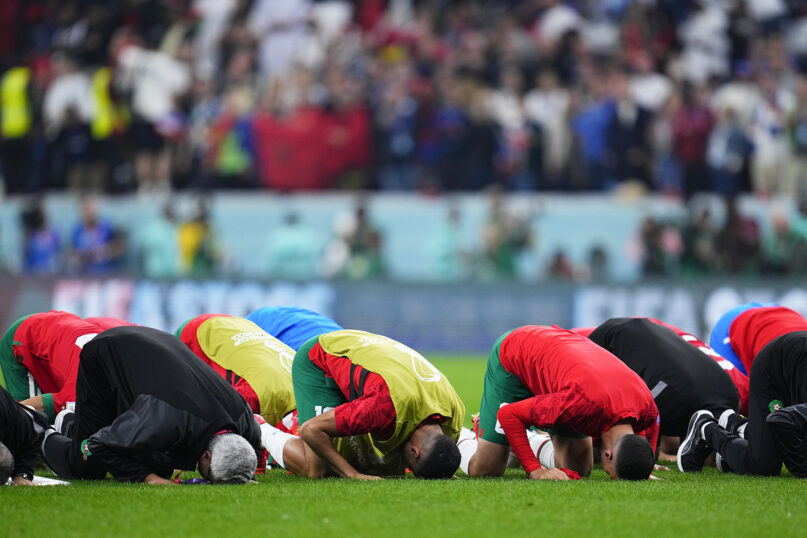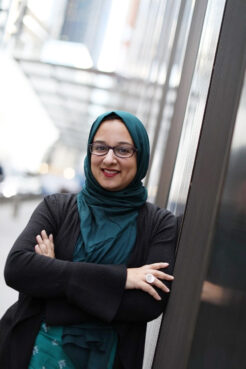(RNS) — To say the Muslim “ummah” (global community) has been united under the banner of red and green in supporting and standing with Morocco’s football team at this year’s FIFA World Cup in Qatar doesn’t begin to properly describe it. Even in their semifinal defeat to France on Wednesday, the joy, pride and love for Morocco’s footballers never wavered.
Athletes engaging in open forms of prayer or religious ritual prior to, during or after a game or match is not uncommon — whether an athlete is crossing herself before a big play, lifting a finger up to acknowledge God, kneeling on one knee with head bowed in prayer or prostrating on the ground in sujood. The latter, a practice done mainly by Muslims during ritual prayer (and also as a gesture of submission and thanks — called sajdat shukr — to God outside of ritual prayer), has especially ignited the hearts of Muslims worldwide during this year’s World Cup.
The Muslim sujood, or prostration, as elegantly described by Dalia Mogahed, director of research at the Institute for Social Policy and Understanding, is a five-point floor contact position: Forehead, nose, hands, knees, toes. “Each of these body parts signifies something that has been put in surrender to God. The forehead (my will). The nose (my ego). My hands (my work). My knees and toes (my steadfast forward motion). It means I surrender all of me to Him.”
She goes on to elaborate, “And what about the heart? This is the beautiful thing. In the sajdah (or sujood), the heart is above the mind, signifying that the heart is king, not the mind. The mind understands according to the state of the heart. Bitter hearts have minds who suspect everyone. Pure hearts have minds who see the good. And in this state of surrender, the heart is superior.”
This is why, as Morocco continued it’s epic advance into the semifinal match, our Muslim hearts swooned to see them not only win, but do so while being unapologetically Muslim on the field: from reciting Surah al Fatiha, to players hugging and dancing with their mothers on the field (begetting what seemed like a million shared images of son-mother joy with some form of the caption, “Your mother, your mother, your mother,” invoking a popular hadith in Islam that pays honor to mothers), to prostrating at the end of matches.
It was a joyous expression of Muslimness in front of a world audience on a global sporting stage the likes of which many of us hadn’t seen in recent memory.
Many media outlets rushed to capture this story and describe what was unfolding on and off the pitch with breathless descriptions. But in doing so, mixed in with the haste of churning out constant stories under tight deadlines, some fell short in understanding what they were writing about, a problem I’ve certainly faced myself on occasion in my more than two decades as a religion journalist and editor.
ESPN.com published a story after the semifinal match in which the first iteration of the story described the sujood of the Moroccan players after their loss to France: “Almost as one, they bowed to their supporters. Not like concert pianists after a performance, but on all fours, heads down, appearing to kiss the ground of Al Bayt stadium. It felt solemn. It felt genuine. And the crowd roared mightily in approval.”
Please note that the story, as it is live now, does not include this description of the prostration because Muslims reacted in droves to how it was originally written, suggesting that the prostration, which was for Allah, was instead for the fans.
Nancy A. Khalil, an assistant professor in the Department of American Culture in the Arab and Muslim Studies program at the University of Michigan in Ann Arbor, felt the error was egregious enough that she reached out to the journalist. “It was a good article, and that made me feel like it was worth reaching out to the journalist. (The erroneous description of sujood) could’ve easily been avoided and the implication was very offensive, even to the players who were grieving a loss.”
The journalist enthusiastically responded to Khalil, thanking her for pointing out the error, and two iterations later, the line now reads, “Almost as one, they bowed on the pitch in prayer, and then thanked their supporters. It felt solemn. It felt genuine. And the crowd roared mightily in approval.”
Mistakes happen all the time in reporting and writing, despite our best efforts as journalists. By reflecting on this, I don’t mean to call out or belittle the ESPN journalist. But, as Khalil told me, “It’s an interesting moment because a lot of people still think this is connected to Islamophobia. Bias is implicit.”
The journalist, Khalil said, may not think he was being Islamophobic but may have thought, “‘I’m going to describe it as I see it, and that’s OK.’ And there wasn’t a push from (his editors) to ensure that he was correct.”
In all my years of covering and coordinating coverage of Muslims in America, I’ve questioned numerous times if I need to publish yet another article on some aspect of hijab or how Muslims pray or how Muslims condemn terrorism. But time and again, the necessity to do so is proven when I read reported articles and columns that get wrong things that should be pretty easy to factually and accurately write.
“What I don’t want to get lost here,” said Khalil, “is how this whole context of anti-Muslim bias and orientalism is systemic, and this is how it unfolds.”
For Khalil, it feels all the more insidious when it comes from allies. “Even someone who is writing a good piece like (the ESPN.com) one, perpetuates it. The rest of the article was really good, but we couldn’t focus on that.”
Perhaps the biggest lost opportunity in all this was for journalists and non-Muslims to understand how even in loss, Muslims will do sujood, when it is more common to see some Muslim athletes prostrate after a victory.
“Because this is what victory, real victory is,” said Mogahed. “It means you thank (God) when you win and when you lose. You thank him for getting you this far. You thank him for keeping you fighting until the last moment. You thank him for keeping you hopeful and unapologetically who you are through a process and a world that steers you away from your truth at every turn. This is winning.”
(Dilshad D. Ali is a journalist and blog editor for the website Haute Hijab, an e-commerce company that works to serve Muslim women. The views expressed in this commentary do not necessarily reflect those of Religion News Service.)






